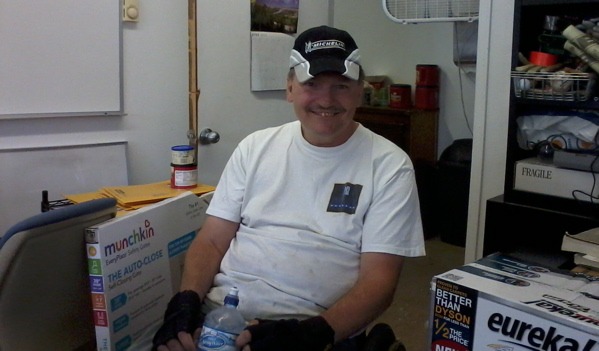
“North Denver Cares Food Pantry, this is Bryan.” With his eyes closed, a wireless phone nestled next to his ear and his office chair titled back, pantry director Bryan Decker listens to a caller’s question. “Yep, our hours are Tuesday and Wednesday 10 to 2. Thursday registration is at 5, worship service at 5:15 and we give out food at 6…”
He hangs up, but soon gets another call and another and another. “…No, we don’t serve your zip code. Try one of these [pantries] in Adams County…”
“…Nope, we don’t do rental assistance. We send all those to HHS [Health and Human Services]…”
Long-time volunteer Dennis Drieling wheels into the North Denver Cares (NDC) office to report the pantry floor is cleaned up and ready to go for Thursday morning’s special food distribution for seniors. Another volunteer pops in to report that a minivan with a broken air-conditioning unit is in the parking lot for Decker, a retired mechanic, to look at.
Highlights of a local pantryAccording to North Denver Cares Food Pantry director Bryan Decker, six of every 10 NDC clients are currently unemployed. “We’re not just getting the poor and working poor anymore. We’ve been getting quite a few people who lost their jobs and were making good money. You typically raise your standard of living when you make more so those people are on the edge now. There were two guys in her last week that were [unemployed] engineers and didn’t know how they were going to make it. One’s wife was a schoolteacher who had to cut back her hours to part-time, and he thought they could live off savings for maybe six months. Those sorts of situations are more common lately.” We profiled NDC in a Nov. 30, 2010, piece, and NDC is also mentioned on p. 34 of The Sweep Report by Everyday Epics founder Marrton Dormish, and Karen Smith. |
Bryan and his wife, Marilyn Decker, run the faith-based non-profit pantry, located at 6900 W. 117th Ave., Suite 700-W, in Broomfield, Colo., without paid staff. Yet they and their crew of several hundred volunteers last year distributed 2.1 million pounds of free food to needy individuals and families in Broomfield and Boulder counties. NDC distributed 20 percent more food in the first six months of this year than in 2011, and projects to give out 2.6-3 million pounds of food by the end of 2012. Most of NDC’s food comes from Community Food Share based in nearby Niwot, Colo..
Despite the increased demand for food and NDC’s corresponding efforts to meet that demand, it made the local newspaper this spring because it lost several key donors and had to pay an increase in rent for its warehouse and distribution center.
“Right now it’s strictly by faith,” Decker says. “I haven’t had 100 percent funding for about five months now. Every month, though, we get money to pay rent and meet our expenses. About half of what we need we get through regular monthly support, and the other half just seems to come in.”
NDC has to pay $3,300 per month for its rent and utilities, and about $1,000 per month to fuel, maintain and license its four loading trucks.
“I’ve pretty much turned into a scrounger,” Decker says, noting that due to NDC’s lack of overall funding he relies more on finding free donations of surplus supplies than in the past.
He is optimistic about NDC’s two pending grant applications, one of which has the potential to help fund the pantry for two years. In addition to the support of several local churches, approximately half of NDC’s current financial backing comes from individuals and businesses.
Most pantries, including NDC and its relatively smaller local counterpart operated by Broomfield FISH, by necessity restrict their clientele to nearby residents, so the threat to NDC’s financial stability is also a threat to the food security of its clients.
Similar scenarios are being replayed in communities across the region and the country, such as in Black Hawk County, Iowa, where a survey of not-for-profits found widespread anxiety about the current “funding climate.”
This less-than-ideal climate threatens veteran agencies like NDC, as well as startups like Medical Respite Boulder, an effort begun in the spring of 2011 to provide home-type care for sick or injured people who are homeless in Boulder, Colo. Last October, Medical Respite Boulder went on hiatus due in part to lack of funding.
The non-profit funding crunch has been a major theme of recent industry reports such as “The Quiet Crisis” by Civic Enterprises and the Democratic Leadership Council, and the 2011 State of the Sector Survey by the Nonprofit Finance Fund, but it’s also widespread enough to garner coverage from CNN, the Huffington Post and the San Francisco Chronicle.
In the meantime, people like Bryan Decker continue their work. And when the phone at NDC rings again, he still answers, “North Denver Cares Food Pantry, this is Bryan.”


